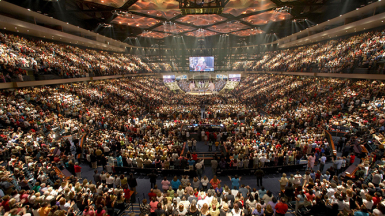
It's a familiar phrase, and one that most of us have uttered in some form or other: "I like Jesus; the problem is the Church." Whether it's caused by disgust at abuse scandals, despair at the loveless attitudes some churches seem to publicly display around issues of morality or disdain at the often woefully irrelevant attempts Christians can make to engage the culture around them, we've all at one point shaken our head and thought: I give up. As the title of one 2008 documentary put it: Lord, Save me from Your Followers.
That sentiment has become increasingly popular in recent years, and appears in several forms. On one level there are simply those who reject traditional 'Church', preferring the increasingly prevalent idea of 'church from home' or saying things like, "Church for me is going for a long walk with my family." There's a more nuanced version though, which involves rejecting part, but not all of the body of Christ. That's where we might say that we love the particular stream or denomination that we find ourselves in, but struggle to feel any affiliation to some of the other wings of the Church. So whether it's felt on an indiscriminate scale or directed at a certain part of the body, most Christians can identify with the culturally-popular idea that the Church is out-of-date, misguided and spiteful. It's just that for many of us, those problems are in another part of the Church from which we keep ourselves hygienically sealed-off.
The question is whether that's ok. Can we really do a good job of following Jesus while giving up on all or part of his Church?
Jesus clearly had high hopes for his Church. He declared he was 'building it himself (on the rock of Peter: Matthew 16:18), that it would not be defeated by 'hell' (same verse), that he was going to grow it with people from outside the traditional 'tribe' (John 10:16), and that even so his great prayer was for unity among the members (John 17:21). Right from the start, he understood the risks and the tension of bringing very different people together in a single, gigantic community; yet doing so still became his great plan for winning over the world (Matthew 28: 18-20).
Jesus' vision for the Church was all-inclusive and all-supportive. Everyone got to be a part of the same glorious organisation; the ideas of opting-out or becoming selective about who's involved simply didn't fit with it. Paul picks up a similar thread in Ephesians 2: 19-21 when he writes famously about the Church as a body of people which becomes a temple, rather than a building full of people. "Consequently," he says, "you are no longer foreigners and strangers, but fellow citizens with God's people and also members of his household, built on the foundation of the apostles and prophets, with Christ Jesus himself as the chief cornerstone. In him the whole building is joined together and rises to become a holy temple in the Lord."
In other words, it's not just that being part of the Church is a vital element of discipleship; we need to recognise and accept that we're part of the whole broad Church.
What does that mean in practice? We probably start by practising a little humility and submission towards those parts of the Church with which we struggle to identify. And while trying to feel differently is a positive thing, attitudes rarely change without action. Listening to, meeting and engaging with our distant and estranged cousins in the faith is always the best way to break down boundaries and create real unity; you always find it much harder to dislike people once you've actually sought to understand them. If you're someone who has all but given up on Church, it might just mean trying again.
Of course, that's undeniably hard. It's much easier to cast off a wing of the church that's racked by abuse scandals, than to willingly share in its sufferings. It's a lot more fun to enjoy a cynical giggle at the hapless attempts of an ageing local church to appear relevant in their community than to identify and pray with them. And it's much less stressful to roll our eyes at megachurch behaviours than to celebrate the good in them. Still, I believe Jesus would have us take the harder path in each case. Even if you're someone who has been badly burned or even abused by Church in the past – and I don't take that lightly – I want to believe that it can still be a place of hope, restoration and growth for you.
Mahatma Gandhi famously once said that "I like your Christ, I do not like your Christians. Your Christians are so unlike your Christ." Our instinctive reaction is to pin that accusation on other people; on distant parts of the Church with which we feel no connection or affiliation. In doing so we become like the Pharisee in Luke 18:11 who says "God, I thank you that I am not like other people", when in fact the change always starts with us. Our response in fact should be to try to be much more like our Christ; perhaps developing a love for his Church is as good a place as any to start.
Martin Saunders is a Contributing Editor for Christian Today and the Deputy CEO of Youthscape. You can follow him on Twitter: @martinsaunders
















